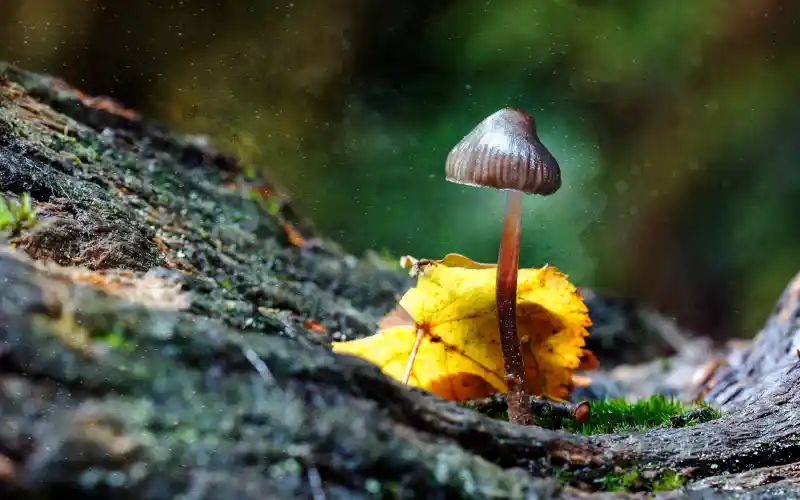Connect with us
Published
8 months agoon

A study by American Medical Association, published late last month, sought to measure the “efficacy and safety of psilocybin in patients with major depressive disorder” and to “evaluate the magnitude, timing, and durability of antidepressant effects and safety of a single dose of psilocybin in patients with [major depressive disorder].”
Researchers conducted a “a randomized, placebo-controlled, 6-week trial in 104 adults, a 25-mg dose of psilocybin administered with psychological support,” ultimately determining that the psilocybin treatment “was associated with a rapid and sustained antidepressant effect, measured as change in depressive symptom scores, compared with active placebo,” and that no “serious treatment-emergent adverse events occurred.”
“A 25-mg dose of psilocybin was well tolerated and may hold promise as a treatment for major depressive disorder when combined with psychological support,” the authors of the study wrote.
“Psilocybin shows promise as a treatment for major depressive disorder,” they added.
The authors said that the psilocybin treatment “was associated with significantly reduced” scores on the Montgomery-Asberg Depression Rating Scale, a measurement of the severity of depression, relative to those administered the niacin placebo. “Psilocybin treatment was also associated with significantly reduced Sheehan Disability Scale,” the authors wrote, referring to a clinical measurement of impairment.
“More participants receiving psilocybin had sustained response (but not remission) than those receiving niacin,” the authors said.
“There were no serious treatment-emergent [adverse events]; however, psilocybin treatment was associated with a higher rate of overall [adverse events] and a higher rate of severe [adverse events].”
In their concluding analysis, the authors said that psilocybin treatment “was associated with a clinically significant sustained reduction in depressive symptoms and functional disability, without serious adverse events.”
“These findings add to increasing evidence that psilocybin—when administered with psychological support—may hold promise as a novel intervention for [major depressive disorder],” they said.
It is hardly the first piece of research to arrive at such a conclusion. Earlier this summer, a group of British researchers suggested that psilocybin is not only an effective treatment for those suffering from depression, but also an economical one.
The researchers found that the cost of psilocybin-assisted therapy typically “varied from £6132 to £7652 depending on the price of psilocybin.”
“This compares to £3528 for conventional medication alone, £4250 for [cognitive behavioural therapy] alone, and £4197 for their combination. [Quality-adjusted life years] were highest for psilocybin (0.310), followed by [cognitive behavioural therapy] alone (0.283), conventional medication alone (0.278), and their combination (0.287),” the researchers said. “Psilocybin was shown to be cost-effective compared to the other therapies when the cost of therapist support was reduced by 50% and the psilocybin price was reduced from its initial value to £400 to £800 per person. From a societal perspective, psilocybin had improved cost-effectiveness compared to a healthcare perspective.”
A separate study released earlier this year found that psilocybin could also be beneficial for those with obsessive-compulsive disorder.
The researchers behind that study conducted a “marble burying test” on a group of male mice.
“Twenty glass marbles were placed equidistant from each other in a 5?×?4 pattern. The experiment was done under dim light in a quiet room to reduce the influence of anxiety on behavior. The mice were left in the cage with the marbles for a 30-min period, after which the test was terminated by removing the mice,” the researchers said. “A marble was considered buried when two-thirds or more of its size was covered with burying substrate, and the number of buried marbles was counted after 30?min.”
“All mice underwent a pretest without any injection, and the number of marbles buried was counted. Only mice that buried at least 15 marbles were selected to perform the test after drug administration. Eighty percent of pretested mice fulfilled this criterion and were used in the definitive experiment, which took place at least a week following the pretest,” they added.
The researchers determined that the mice that were ““administered psilocybin buried 32.84% fewer marbles over 30?min” than the other mice.
In July, a group of doctors from the University of Texas MD Anderson Cancer Center in Houston announced that, starting next year, they will begin a study that examines “the effects of psilocybin for patients with controlled advanced cancer on maintenance therapy experiencing challenges with mental health.”
“Psychedelics, specifically psilocybin, have shown promise in treating various psychological symptoms including anxiety, depression, post-traumatic stress disorder, and end-of-life distress,” the doctors wrote in the announcement. “Although a study focusing on gynecologic cancers has not yet been completed, the studies with mixed cancer diagnosis are encouraging.”
Those doctors said that psilocybin-assisted psychotherapy “suggests lasting benefits from just one to two sessions, compared with the chronic use that is needed with selective serotonin reuptake inhibitors.”


Study Reveals State Cannabis Legalization Lowers Immigrant Deportation


DEA Challenges Bid To Use Psilocybin Under ‘Right To Try’ Legislation


Vegans Rejoice as Farmers Switch from Chickens to Hemp


Louisiana Legislative Committee Unanimously Passes Adult-Use Cannabis Framework Bill


Louisiana House Bill to Regulate Hemp Products Advances Along With Senate Bill to Ban


Cresco Labs Workers Reportedly De-Unionize
